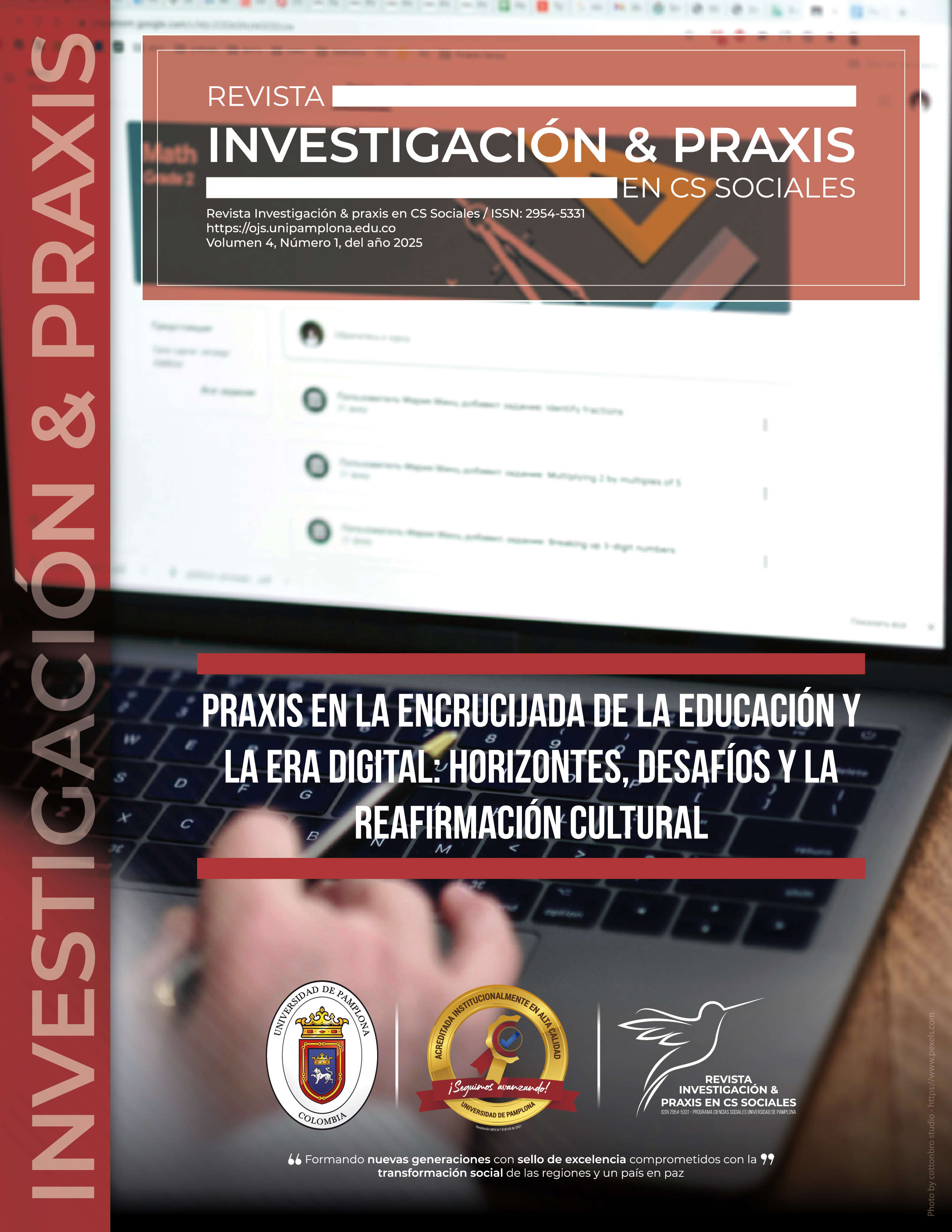Horizontes Compartidos: Un Estudio Bibliográfico sobre la Inteligencia Artificial Generativa en la Educación Básica, sus Ecos Humanos, Desafíos y la Búsqueda de un Aprendizaje con Sentido (2020-2024)
DOI:
https://doi.org/10.24054/ripcs.v4i1.4010Palabras clave:
Inteligencia Artificial Generativa, Educación Básica, Personalización del Aprendizaje, Habilidades del Siglo XXI, Humanismo Digital, Ética Educativa, Estudio Bibliográfico, 2020-2024Resumen
La Inteligencia Artificial Generativa (IAG) se instaló en el panorama educativo de la educación básica entre 2020 y 2024, generando tanto expectativas como hondas reflexiones. Este estudio bibliográfico se propuso analizar, desde una perspectiva humanista, el impacto de la IAG durante este periodo. Se examinaron las oportunidades que ofreció para la personalización del aprendizaje y el desarrollo de habilidades del siglo XXI, así como los desafíos éticos, pedagógicos y sociales que emergieron. Mediante una revisión sistemática de literatura académica publicada entre 2020 y 2024, se identificaron tendencias clave y se discutieron implicaciones para la comunidad educativa. Los hallazgos de esta revisión sugirieron que, si bien la IAG presentó herramientas prometedoras, su integración requirió una planificación cuidadosa, una formación docente continua y un enfoque centrado en el estudiante para mitigar riesgos como la dependencia tecnológica, el sesgo algorítmico y la brecha digital, buscando siempre preservar la esencia humana del acto educativo.
Referencias
Bender, E. M., Gebru, T., McMillan-Major, A., & Shmitchell, S. (2021). On the Dangers of Stochastic Parrots: Can Language Models Be Too Big? In Proceedings of the 2021 ACM Conference on Fairness, Accountability, and Transparency (pp. 610–623). Association for Computing Machinery.
Benjamin, R. (2019). Race after technology: Abolitionist tools for the new Jim Code. Polity Press.
Braun, V., & Clarke, V. (2006). Using thematic analysis in psychology. Qualitative Research in Psychology, 3(2), 77–101.
Braun, V., & Clarke, V. (2019). Reflecting on reflexive thematic analysis. Qualitative Research in Sport, Exercise and Health, 11(4), 589-597.
Buckingham, D. (2023). Tech-ucation: Critical perspectives on digital learning and the new logics of education. Routledge.
Carr, N. (2020). The shallows: What the internet is doing to our brains (2nd ed.). W. W. Norton & Company.
Cooper, H., Hedges, L. V., & Valentine, J. C. (Eds.). (2019). The handbook of research synthesis and meta-analysis (3rd ed.). Russell Sage Foundation.
Deci, E. L., & Ryan, R. M. (2000). The "what" and "why" of goal pursuits: Human needs and the self-determination of behavior. Psychological Inquiry, 11(4), 227–268.
Eaton, S. E. (2021). Plagiarism in higher education: Tackling tough topics in academic integrity. Libraries Unlimited.
Floridi, L., Cowls, J., Beltramini, M., Saunders, D., Vayena, E., ... & Taddeo, M. (2018). An ethical framework for a good AI society: Opportunities, risks, principles, and recommendations. AI & Society, 33(4), 689-707.
García-Peñalvo, F. J., & Alonso-de-Prado, A. M. (2023). Inteligencia artificial
Goodfellow, I., Bengio, Y., & Courville, A. (2020). Deep learning. MIT Press.
Livingstone, S., & Helsper, E. J. (2021). The LSE handbook of media, education and digital literacy. SAGE.
Long, D., & Magerko, B. (2020). What is AI Literacy? Competencies and Design Considerations. In Proceedings of the 2020 CHI Conference on Human Factors in Computing Systems (pp. 1–16). Association for Computing Machinery.
Luckin, R., Holmes, W., Griffiths, M., & Forcier, L. B. (2016). Intelligence Unleashed: An argument for AI in Education. Pearson.
Mishra, P., & Koehler, M. J. (2006). Technological Pedagogical Content Knowledge: A framework for teacher knowledge. Teachers College Record, 108(6), 1017–1054.
Mitchell, M. (2019). Artificial intelligence: A guide for thinking humans. Farrar, Straus and Giroux.
Noble, S. U. (2018). Algorithms of oppression: How search engines reinforce racism. New York University Press.
OECD (2018). The Future of Education and Skills: Education 2030. OECD Publishing.
OpenAI. (2023). GPT-4 Technical Report. arXiv:2303.08774.
Page, M. J., McKenzie, J. E., Bossuyt, P. M., Boutron, I., Hoffmann, T. C., Mulrow, C. D., ... & Moher, D. (2021). The PRISMA 2020 statement: an updated guideline for reporting systematic reviews. BMJ, 372, n71.
Pane, J. F., Steiner, E. D., Baird, M. D., & Hamilton, L. S. (2017). Informing progress: Insights on personalized learning implementation and effects. RAND Corporation.
Partnership for 21st Century Skills (P21). (2019). Framework for 21st Century Learning. P21.org.
Petticrew, M., & Roberts, H. (2006). Systematic reviews in the social sciences: A practical guide. Blackwell Publishing.
Piaget, J. (1952). The origins of intelligence in children. International Universities Press.
Sancho-Gil, J. M., Rivera-Vargas, P., & Miño-Puigcercós, R. (2020). Moving beyond the predictable arguments: The paradox of ICT and education in the time of COVID-19. Comunicar, 28(65), 9-17. https://doi.org/10.3916/C65-2020-01
Selwyn, N. (2022). EdTech: A critical look at the digital future of education. Polity Press.
Tondeur, J., Scherer, R., Siddiq, F., & Baran, E. (2021). Understanding the grassroots of educational technology integration: A systematic review of the literature on teachers’ beliefs. Educational Research Review, 34, 100401.
UNESCO (2023a). ChatGPT and Artificial Intelligence in higher education: Quick start guide. UNESCO.
UNESCO (2023b). Guidance for generative AI in education and research. UNESCO.
Van Dijk, J. A. G. M. (2020). The digital divide. Polity Press.
Vaswani, A., Shazeer, N., Parmar, N., Uszkoreit, J., Jones, L., Gomez, A. N., ... & Polosukhin, I. (2017). Attention is all you need. In Advances in Neural Information Processing Systems 30 (pp. 5998–6008). Curran Associates, Inc.
Vygotsky, L. S. (1978). Mind in society: The development of higher psychological processes. Harvard University Press.
Zawacki-Richter, O., Marín, V. I., Bond, M., & Gouverneur, F. (2019). Systematic review of research on artificial intelligence applications in higher education – where are the educators? International Journal of Educational Technology in Higher Education, 16(1), 39.
Publicado
Número
Sección
Licencia
Derechos de autor 2025 Marisa Alejandra Lara Escobar

Esta obra está bajo una licencia internacional Creative Commons Atribución 4.0.










